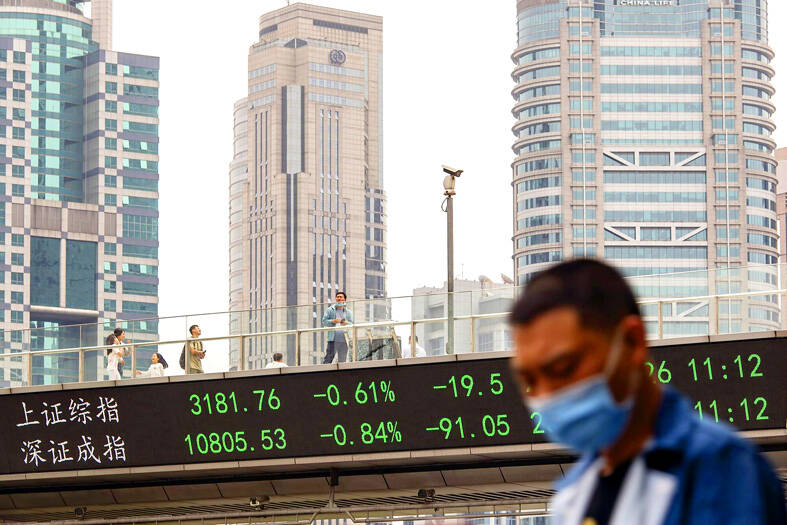Two clients of Chinese trust company Zhongrong International Trust Co (中融國際信託) said the firm delayed payment of maturing wealth products amid reports of liquidity concerns at a major shareholder, the latest sign of turmoil in China’s financial sector.
Nacity Property Service Co (南都物業) and KBC Corp (金博碳素) first announced news of the delayed payments in statements on Friday evening.
KBC, a carbon products manufacturer, said in a statement with the Shanghai Stock Exchange that the delayed payments were tied to 60 million yuan (US$8.3 million) invested with Zhongrong and would not affect company operations.

Photo: Bloomberg
Chinese asset management firm Zhongzhi Enterprise Group Co (中植企業) — a financial giant in China whose business cuts across trusts companies, private equity and wealth management — has an ownership stake in Zhongrong.
Late last week, there was speculation that the delayed payments were related to a liquidity crisis at Zhongzhi, which has about 1 trillion (US$138.19 billion) yuan in assets under management, according to Caixin.
Representatives for Zhongrong could not be reached for comment yesterday outside of business hours.
The news of Zhongrong’s delayed payout comes as investors have been on edge recently over concerns of the health of China’s economy and financial markets.
The trust industry has also been pressured by the crisis in China’s property sector in recent years, with companies defaulting on investment products linked to property developers in the past.
Firms including Zhongrong and MinMetals Trust Co (五礦信託) bought stakes in at least 10 real-estate projects last year, betting that unfinished homes will eventually yield cash to pay off some of the US$230 billion in property-backed funds they have issued to investors.
One of China’s largest developers, Country Garden Holdings Co (碧桂園), unsettled markets last week amid fears of a default as it reported steep losses in the first half of the year.
The company said in filings to the Shenzhen Stock Exchange on Saturday night that it would suspend trading in nearly a dozen onshore bonds starting today, adding to concerns about the potential drag the industry will have on growth in the world’s second-largest economy.
China’s trust industry combines characteristics of commercial and investment banking, private equity and wealth management. Firms in the sector pool household savings to offer loans and invest in real estate, stocks, bonds, commodities, and even bottles of sorghum liquor. No other firms in the financial industry operate across all these asset classes.

Taiwan Semiconductor Manufacturing Co (TSMC, 台積電) would not produce its most advanced technologies in the US next year, Minister of Economic Affairs J.W. Kuo (郭智輝) said yesterday. Kuo made the comment during an appearance at the legislature, hours after the chipmaker announced that it would invest an additional US$100 billion to expand its manufacturing operations in the US. Asked by Taiwan People’s Party Legislator-at-large Chang Chi-kai (張啟楷) if TSMC would allow its most advanced technologies, the yet-to-be-released 2-nanometer and 1.6-nanometer processes, to go to the US in the near term, Kuo denied it. TSMC recently opened its first US factory, which produces 4-nanometer

GREAT SUCCESS: Republican Senator Todd Young expressed surprise at Trump’s comments and said he expects the administration to keep the program running US lawmakers who helped secure billions of dollars in subsidies for domestic semiconductor manufacturing rejected US President Donald Trump’s call to revoke the 2022 CHIPS and Science Act, signaling that any repeal effort in the US Congress would fall short. US Senate Minority Leader Chuck Schumer, who negotiated the law, on Wednesday said that Trump’s demand would fail, while a top Republican proponent, US Senator Todd Young, expressed surprise at the president’s comments and said he expects the administration to keep the program running. The CHIPS Act is “essential for America leading the world in tech, leading the world in AI [artificial

REACTIONS: While most analysts were positive about TSMC’s investment, one said the US expansion could disrupt the company’s supply-demand balance Taiwan Semiconductor Manufacturing Co’s (TSMC, 台積電) new US$100 billion investment in the US would exert a positive effect on the chipmaker’s revenue in the medium term on the back of booming artificial intelligence (AI) chip demand from US chip designers, an International Data Corp (IDC) analyst said yesterday. “This is good for TSMC in terms of business expansion, as its major clients for advanced chips are US chip designers,” IDC senior semiconductor research manager Galen Zeng (曾冠瑋) said by telephone yesterday. “Besides, those US companies all consider supply chain resilience a business imperative,” Zeng said. That meant local supply would

BIG INVESTMENT: Hon Hai is building the world’s largest assembly plant for servers based on Nvidia Corp’s state-of-the-art AI chips, Jalisco Governor Pablo Lemus said The construction of Hon Hai Precision Industry Co’s (鴻海精密) massive artificial intelligence (AI) server plant near Guadalajara, Mexico, would be completed in a year despite the threat of new tariffs from US President Donald Trump, Jalisco Governor Pablo Lemus said. Hon Hai, also known as Foxconn Technology Group (富士康科技集團), is investing about US$900 million in what would become the world’s largest assembly plant for servers based on Nvidia Corp’s state-of-the-art GB200 AI chips, Lemus said. The project consists of two phases: the expansion of an existing Hon Hai facility in the municipality of El Salto, and the construction of a